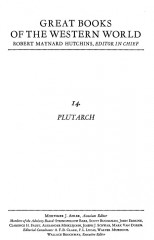
Author : Great Books of the Western World - Hutchins Robert Maynard
Title : Volume 14 Plutarch
Year : 1952
Link download : Great_Books_of_the_Western_World_-_Volume_14_Plutarch.zip
PLUTARCH lived in the time of the emperors Nerva, Trajan, and Hadrian, a time usually thought of as the beginning of the best age of the Roman imperial period. and as the last great era of Greek and Roman literature. He is not quoted nor even mentioned by his celebrated contemporaries, Juvenal, Quintilian, Martial, Tacitus, and the younger Pliny. He never wrote directly of himself, and the sources for his . life are the many scattered passages where some reminiscence appears incidentally. Later, when his fame became widespread, legends grew up to supplement the little extant knowledge. The legends tended to confirm the impression made by his works that he was to an exceptional degree representative of his time. Plutarch was pictured as tutor to Trajan, to whom he was supposed to have dedicated a treatise on the good of a prince after the manner of Plato's epistle to Dion. He was supposed to have lived for a long period in Rome, where he was held in great-esteem, honored with consular rank, and later appointed governor of Greece by the Emperor, who had been his pupil. These legendary titles and distinctions apparently have no basis in fact. The truth seems to be that the man who wrote of the fall of Athens, of the growth of Roman dominion over the East, of the overthrow of the Roman republic, was a Theban provincial, fortunate in his ancestors and in his education, contented with his family and his friends, and loyal in a spirited way to his town. He did go to Rome on several occasions. His visits were short. He himself records that he had "no leisure while there to study and exercise the Latin tongue, as well for the business I had then to do, as also to satisfy them that came to learn philosophy of me."He adds, however, that he had familiar conversation with many of the highest men in Rome; his lack of Latin would not prevent that in the "Greek city," as Juvenal indignantly called it. From this "great place, containing plenty of all sorts of books" he returned to "his poor little town and remained there willingly, being loath to make it less by the withdrawal of even one." The place of his birth was Chaeronea in Boeotia. It was a town not incapable of stirring the imagination by the contrast of its memories with its present obscurity. Plutarch relates that long ago Epaminondas had called it "the playfield of Mars." Not as long ago as that, Macedon and the allied armies of Thebes and Athens had fought on its plains a battle "fatal to Greek liberty." Chaeronea appears in Plutarch's life of Antony, where he recalls the story he had from his great-grandfather Nicarchus. The citizens of the town, Nicarchus among them; had been forced by Antony's supply officers to carry corn like beasts of burden. They were starting out in file on their second trip to the sea when news came of Antony's defeat at Actium. "Antony's purveyors and soldiers fled upon the news, and the citizens of Chaeronea divided the corn among themselves." Among the sons of Nicarchus was Lamprias, Plutarch's grandfather. Plutarch remembers him with joy as a man whose wit was affected by wine as incense by fire. Lamprias too figures in the life of Antony as able to pass on, from a friend who had lived in Alexandria, tales of the luxurious revels of Antony and Cleopatra. Plutarch's father is mentioned by him a number of times, once with vivid gratitude for the way in which he taught his son to share honor and avoid envy. As a young man, Plutarch studied at Athens with Ammonius, reputedly an Egyptian who taught at Alexandria before settling in Athens. Plutarch boarded in his teacher's house and records that one of his fellow students was a descendant of Themistocles. It is not known when he wrote the series of treatises collected under the title Moralia.Many of them, he tells us, were expansions of his notes for lectures at Rome. It was after his return to Chaeronea that he compiled his Symposiacs, or Table Talk, wherein a variety of personages are depicted in discussion of a wide variety of lively, often trivial, problems. According to most opinion, he began work on the Parallel Lives towards the end of his life. He states that his original intention had been to in struct others, but in the course of writing he discovered that more and more it was he himself who was deriving profit and stimulation from "lodging these men one after the other in his house." In his native Chaeronea, Plutarch seems to have held many municipal offices. When he was ridiculed on one occasion for his patience in discharging trivial duties, he said: "You remember what Antisthenes said, whell someone was surprised that he carried some pickled fish home from the market: 'But it is for myself.' When you reproach me for watching tiles measured out and stone and mortar brought up, I give you the converse answer: 'It is not for myself, but for the city.''' He filled the position of Archon a number of times and served as a priest of Apollo at Delphi. His term in this last office seems to have lasted to the end of his life, for in one of his Symposiacs he argues on the question Whether an Old Man should continue in Public Life by submitting that no one would say to him: "You have served for many pythiads, you have taken part enough in the sacrifices, processions, and dances, and it is high time, Plutarch, now you are an old man, to lay aside your garland and retire as superannuated from the oracle." There is much testimony in his writing of the tenderness and warmth in the smaller circle of his family. Plutarch wrote affectionate descriptions of his little girl, Timoxena;and a famous letter of consolation to his wife at the time of this child's death. In another letter to his wife he writes that he finds '~scarcely an erasure, as in a book well-written" in the happiness of his long life. Legend reports that the people of Rome requested after his death that a statue be erected to honor his virtue. This translation was made by many hands, but is commonly called the Dryden Translation. ...

Demolins Edmond - Saint Louis
Auteur : Demolins Edmond Ouvrage : Saint Louis Année : 19881 Lien de téléchargement :...














